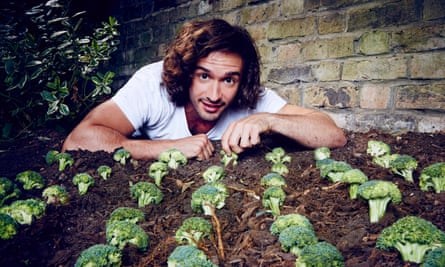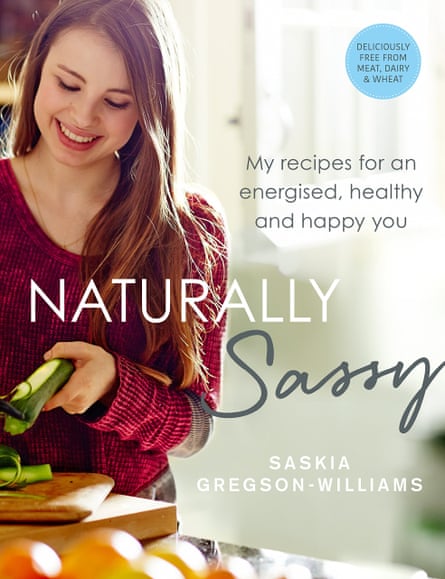‘I think we have an obsession with diets. With fad diets.” This was Ella Mills, the food writer behind Deliciously Ella and bestselling author of arguably the most successful fad diet cookbook series in recent years. Her eponymous first book was the UK’s fastest-selling debut cookbook ever, and she has since gone on to launch two central-London delis, create her own range of “energy balls” and even release a skincare range in collaboration with Neal’s Yard. Speaking on last Friday’s Today programme, the blogger was keen to distance herself from so-called “clean eating” and, cleverly, from the crescendo of criticism surrounding the trend.
“I’ve never described myself as ‘clean’,” said Mills, nimbly shadow-boxing with a litheness that probably shouldn’t surprise us, coming from a 25-year-old yogi. She described her frustration at being dubbed the “queen of clean”, and was quick to point out the moralistic overtones that language such as “clean eating” ascribes to food. It was a smart move, preempting the backlash that would come from that evening’s premiere of the BBC documentary Horizon: Clean Eating – The Dirty Truth.

It wasn’t long ago that clean eating seemed untouchable. This new philosophy, popularised by bloggers such as Mills, the Hemsley sisters and Amelia Freer, was roughly the idea that we should eat less processed food and more fruit and veg. It was about doing away with junk food, and staging a return to a more thoughtful way of eating. So far, so sensible, you might think. Although not all of the bloggers used the exact phrase “clean eating”, their approaches fell into step with its core beliefs: slimness is health, health is everything, and – crucially – diets are bad.
Cannily dodging the restrictive and judgement-laden overtones of the dreaded D-word, this generation of cooks was vocal in eschewing old-fashioned diet terminology. The Hemsley sisters’ grain-free manifesto, The Art of Eating Well, wasn’t a diet book, then, but a way to achieve some kind of seductively slinky “wellness”. Healthy-eating guru Madeleine Shaw encouraged us not to count calories, but to “get the glow”. “This isn’t a diet for me; it’s a lifestyle,” Mills told us. It was a world of beauty, happiness and self-love, all bundled lucratively together under the vague banner of wellness. It was worth a fortune.
With their profits and media presence blossoming, however, it wasn’t long before these self-appointed health gurus came under scrutiny. The Hemsleys were incriminated by their support of Dr Natasha Campbell-McBride’s gut and psychology syndrome (Gaps) diet which is as credible as a fortune teller on Southend Pier. The sisters had praised the doctor’s book – Gaps: Natural Treatment for Autism, ADD/ADHD, Dyslexia, Dyspraxia, Depression, Schizophrenia – in a feature on their publisher Penguin’s website about the five books that shaped their food philosophy. (The article in question has since been deleted.)
Natasha Corrett, author of the bestseller Honestly Healthy, was embarrassed last week by the revelation that the inspiration for her alkaline diet, Dr Robert O Young, is facing jail time for practising medicine without a licence. Horizon revealed that Young took more than £62,000 in payment from the family of cancer patient Naima Houder-Mohammed in return for a “cure” of injections of bicarbonate of soda solution. Houder-Mohammed’s condition worsened during her time in Young’s care and she died at 27. Alongside such outright crooks and villains as Young, the hapless Mills doesn’t look so bad.

With the wellness movement coming under fire, it is no surprise that the big names in clean eating are beginning to worry. Across dozens of perfectly glowing, smooth-skinned brows, a glimmer of sweat is beginning to prickle: it’s time to rebrand, or duck out.
As in any argument where money and pride are at stake, it has become a game of semantics. “What even is clean eating after all? I never said I was clean! I’m about purity, not eating clean!” It’s Ross and Rachel going on a “break” all over again. The only way to stay afloat is redefine. When the Hemsley sisters spoke out against clean eating at the launch of their Good to Go food pop-up in Selfridges earlier this month, they were doing just that. “It is a media-coined term,” Jasmine Hemsley insisted. “We have never, ever used the phrase ‘clean eating’.”
This shape-shifting shouldn’t come as a shock. The big players in the wellness movement are just following the principles that drove wellness into the mainstream in the first place: they’re putting a bright new face on the diet industry. When a fad wears thin, you give it a new name. It’s the logic that sent the wholefood 70s careering into the lean and low-fat 80s. It’s how the Atkins diet shed its tired skin to become Wheat Belly, Grain Brain and the multi-million dollar renaissance of low-carb cooking. It’s the constant ebb and flow of diets, precarious health claims and a trend-driven food press, all underpinned by an unfaltering disdain for fat bodies.
Behind the pretty public face of wellness is a far bigger beast. With the exception of fitness guru Joe Wicks, the overwhelming majority of wellness personalities are young women, and it is these women who rise to and eventually fall from grace in the public eye. And yet the machinery of these fads is constructed largely by a small group of men. These are the doctors – self-styled or otherwise – who spin questionable academic studies, patchworks of data and sometimes little more than fanciful anecdotes into best-selling diet industry manifestos.

In contrast to the wellness cooks on our TV screens, these men have credentials to lend weight to the claims they make. There is cardiologist William Davis, whose bestseller Wheat Belly set into motion the anti-grain brigade. There is also “renowned neurobiologist” David Perlmutter, a dull facsimile of Davis. His cynically samey Grain Brain, another low-carb polemic. In a touching display of tenderness, Dr Michael Greger named his 2016 diatribe against junk food How Not to Die. If the science behind wellness is suspect, the blame falls at the feet of these men.
That is not to say that wellness personalities are undeserving of the criticism they face. Those who peddle these nutritional myths ought to be held to account, no matter where in the food chain of bullshit they stand. But hitting out at the salespeople of this pseudoscience without looking to the producers is like buying stocks and shares in the wizard of Oz. It could be that these young women – all perky, pretty and privileged – are the easy targets of our lazy misogyny, or simply that it is easiest at which to level our ire at the most visible proponents of the wellness fad. Either way, it is clear that, unless it is hit at its core, the movement will trundle on, evolving into new and noxious forms of diet culture in different guises.
A share of the blame lies with publishers, too. At a time when money is rare in publishing, editors are digging deep to offer book deals to wellness gurus, no matter the credibility of their claims.

In 2015, Ebury Press published Naturally Sassy by then 17-year-old ballerina and food blogger Saskia Gregson-Williams. The meat-, dairy- and wheat-free cookbook was her debut. She describes having found comfort by learning to cook when she was living away from home as a young teenager while studying at the Royal Ballet School. It was a route out of fixation on the low-fat, low-calorie diets that the other dancers espoused. There is no doubt that Gregson-Williams believes in the healing powers of clean eating. What is less clear is how the publishers were able to justify endorsing a needlessly restrictive diet, from a ballerina (a profession notorious for fostering eating disorders) and then marketing it to impressionable teenage girls.
There are many toxic layers to the wellness phenomenon. It is no coincidence that the faces of wellness are unfailingly young and thin, overwhelmingly white and all the talk of purity against that backdrop of privilege leaves a rather unsavoury taste in the mouth. Wellness is also the unprincipled driftings of the publishing houses with whatever currents lead them to a quick buck. It is the evangelism of wellness bloggers, picking up and shrugging off whatever label will give them the most page views. At its core, it is idea that food is medicine.
It all sounds silly when the fictions of wellness are brought together: gluten is poison; sugar is crack; acidity is cancer; terminal illnesses are no longer terminal. But these sensational claims reach us by insidious means, and those who suggest we ought to just use some common sense underestimate just how muddled the truth about food really is. So, many of us will, at some point or another, turn to the false prophets of the diet industry to cure the ills that our health service is too stretched and too underfunded to deal with. We might become evangelists for wheatgrass for a while, or sing the praises of some superfood that “cured” a dodgy knee. We might laugh these fads off, in time, just as the wellness personalities slip out of their skins and into the next big craze.
We have an obsession with diets. With fad diets. There is no miracle cure, but there is a way to push back: call them as you see them. Wellness is a fad diet. Clean eating is a fad diet. If it promises salvation on a plate, it is a fad diet. Hold the wellness gurus accountable, let them know that their diet is a diet. Make them eat their words.
Five wellness superfoods that aren’t actually that super (according to dietitian Helen Bond)
Coconut oil “One of the few plant oils that is loaded with saturated fat – it has more saturated fat than butter. While advocates argue that it doesn’t have the same detrimental impact on blood cholesterol levels, it still raises total and LDL (bad cholesterol) in our blood.”
Matcha powder “No health claims have been approved for matcha or green tea by the European Food Safety Authority, so it cannot be advertised as having any proven health benefits.”
Coconut water “A 200ml glass would provide the same amount of potassium as one medium banana. Tap water will hydrate you just the same and it is calorie, sugar and cost free.”
Goji berries “The antioxidants in goji berries don’t seem to arrive in our circulation in high enough quantities to have an effect. Plus, the berries are not as high in vitamin C as other fruits.”
Spirulina “This is a rich plant source of vitamin B12, usually only found in animal foods – but spirulina is only eaten in very small amounts, so it won’t contribute much to your overall vitamin B12 intake and it is not absorbed well by the body.”
In numbers
£627m The value of the free-from market in 2016, according to market research firm Mintel. Growth of 52% is predicted over the 2016-21 period, to see the market reach £952m.
27,595,369 The number of posts on Instagram with #cleaneating
£3tr Estimated value of the global wellness economy in 2015
495,191 Books sold by Ella Mills, AKA Deliciously Ella
219,158 Books sold by Amelia Freer, author of Eat. Nourish. Glow
186,477 Books sold by Jasmine and Melissa Hemsley, authors of The Art of Eating Well
122,123 Books sold by Madeleine Shaw, author of Get the Glow: Delicious and Easy Recipes that will nourish you from the Inside Out, and Ready, Steady, Glow; Fresh, Fast Food Designed for Life

Comments (…)
Sign in or create your Guardian account to join the discussion